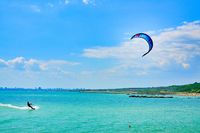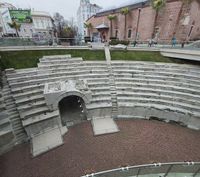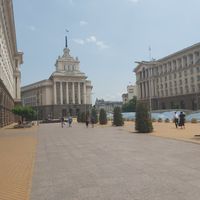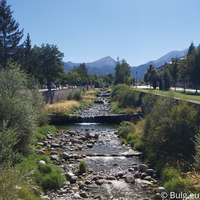Why we emigrated to Bansko
We are the Groen family from North Holland, the Netherlands. In December 2023, we bought a house in Dobrinishte, a small town about 8 kilometres from Bansko in a beautiful mountainous area in Bulgaria.
We decided to leave the Netherlands for several reasons, but mainly to live in the mountains and in a sunnier climate.
As a child, I used to go to Austria every year for skiing holidays and later for walking holidays. It had always been my dream to live in the mountains.
After the coronavirus pandemic, the idea of emigrating slowly took shape. Because of everything that was happening in the Netherlands, everything that was still to come and the high inflation, we started looking for a country within Europe where life is still affordable and more like it should be. That's how Bulgaria came into the picture.
After viewing houses in several regions, we ended up in Bansko, which had always been at the top of our list. For us, this was the ideal region with schools, good roads, good facilities, lots of tourists, mountains and an international community. And not to forget, always beautiful weather!
Our house in Wieringerwaard went on the market in early 2023 and was sold within a few weeks at a profit. The keys were handed over on 1 September and after spending a week staying with grandma with the six of us, we flew from Eindhoven to Sofia on 7 September 2023.
This marked the end of an exciting and uncertain period in the Netherlands, but the beginning of an uncertain and exciting period in our new life. At that point, we did not yet have a home. Then, sometime in October, we arrived in Dobrinishte.
Since April 2024, we have been living permanently in the house we purchased in Dobrinishte. It was in poor condition and is still not finished to this day, but we are very happy there. We have a garden with vegetables, fruit trees and rabbits, and we have two dogs.
We don't want to go back and have made our dream come true!
Why choose Bulgaria as a country to emigrate to?
Sun, sea, beaches, mountains, skiing: Bulgaria is a beautiful country to live in. It is remarkably diverse and has something to offer everyone.
Bulgaria has beautiful mountains, lakes, forests and beaches. Ideal for nature lovers and people who enjoy hiking, skiing or swimming.
There are really warm summers, cold winters (good for winter sports), and pleasant springs and autumns. And an additional advantage: Bulgaria is one of the sunniest countries in Europe, so the sun shines all year round!
Nowadays, more and more people are settling in Bulgaria. Mostly retirees and digital nomads, but also many families with children.
We made this choice ourselves. In 2023, we left the Netherlands behind and never looked back. Although life in Bulgaria certainly has its drawbacks (as every country does), we do not regret this decision. Firstly, because Bulgarians are generally kind and helpful people, but also because we live in the Bansko area and Bansko is simply paradise!
Although it is less well known to the average person, Bulgaria is a wonderful country to live in!
The advantages of living in Bulgaria
- Low cost of living. Housing, groceries, restaurants and services are considerably cheaper than in Western Europe. A good house in the countryside often costs less than a small flat in the UK.
- Mild tax burden. Bulgaria has a fixed income tax rate of 10% for both individuals and companies.
- Nature & climate. Rich and diverse nature: mountains, Black Sea beaches, lakes and forests. Warm summers, snowy winters in the mountains (for winter sports enthusiasts).
- Friendly people and authentic culture. Hospitable people, especially in rural areas. Interesting mix of Balkan, Ottoman and Slavic influences.
- EU member state. You retain free movement of persons, goods and services.
- A quieter life. Especially outside the cities, you can lead a much quieter, less stressful life.
- Growing expat community. More and more Westerners are settling in Bulgaria, especially in places like Sofia, Bansko, Veliko Tarnovo, Plovdiv and on the coast.
Points to consider and disadvantages
- Language barrier: Bulgarian is a Slavic language with Cyrillic script; not everyone speaks English.
- Healthcare: Basic healthcare is available, but quality and access can vary outside cities.
- Infrastructure: Still under development, especially in rural areas. Unfortunately, you may still encounter potholes in the road.
- Bureaucracy: Administrative processes can be very slow or cumbersome.
- Wages & employment: For those seeking local employment (i.e. not working remotely), salaries are relatively low.
Who might be interested in Bulgaria?
- Digital nomads/freelancers (due to low costs and taxes).
- Retirees (peace and quiet, nature, low cost of living).
- Investors (cheap property market, potential for growth).
- People who want to live self-sufficiently (land, peace and quiet, freedom).
The different regions of Bulgaria: where to live?
The Black Sea coast
Many Brits choose to settle on the coast. This is not surprising, as many Brits simply love the sun, sea and beach.
The most popular places for emigrants include Varna, Burgas, Nessebar (Sunny Beach), Dobrich and Balchik.
If you love sun, sea and sand, then the Black Sea coast is definitely recommended as a new place to live!
Plovdiv
Plovdiv is Bulgaria's second largest city after Sofia. With its historic centre, which includes a Roman amphitheatre and a Roman stadium, Plovdiv is a photogenic and charming city.
Many Western Europeans settle here, including in the surrounding villages.
Would you like to live in a vibrant, pleasant environment with lots of shops, history, nature and the mountains nearby? Then Plovdiv is the place for you.
Sofia
Of course, the capital cannot be left out. At first glance, this modern, bustling city may not seem particularly attractive, but once you get to know it better, you will quickly find yourself immersed in a whole new world.
Sofia is home to over a million people, including many British expats. It is by far the largest city in the country and has a lot to offer in terms of shops, facilities and nightlife.
But nature is also always close by, as Vitosha National Park is located just south of the city!
Sofia is perfect for people who feel at home in or near a big city that offers all the conveniences!
Bansko
Bansko is our favourite town in Bulgaria. We moved to the Bansko region in 2023 and don't want to leave.
Bansko is located in the Pirin Mountains and is known as Bulgaria's largest and best ski resort. It is a characteristic mountain town that feels like a real ski resort, while you can be lying on the beach in Thessaloniki or Kavala in just three hours!
Bansko is also a well-known digital nomad hub, golf resort and spa town. So there's plenty to do!
Are you looking for a dynamic environment with a large international community, mountains and ski slopes, and are you adventurous? Then don't hesitate and come to Bansko!
Are you considering emigrating to Bulgaria? Read this important information
Emigrating to Bulgaria is not something to be taken lightly. There is a lot involved, not to mention the differences in culture and language.
Read the important information below to ensure a smooth emigration to this beautiful Eastern European country!
The cost of living in Bulgaria
The cost of living in Bulgaria is generally much lower than in Western Europe. Below is an overview of the main cost items in Bulgaria, excluding taxes (prices are averages as of July 2025 and may vary by city or region):
Food & eating out
Groceries: Similar to the United Kingdom, sometimes cheaper.
Eating out: Cheap restaurant: €7–€10 per person.
Coffee: €1–€3.
Transport
Public transport (monthly pass): €25–€30.
Petrol (per litre): €1.30–€1.50.
Taxi starting rate: €0.60–€1 + €0.50/km.
Utilities
Electricity: £30–£70 per month. Heating is often electric or with wood-burning stoves in cities without central heating.
Water: €5 – €15 per month.
Other costs
Internet: €10 – €20 per month.
Mobile phone subscription: €5 – €15 per month.
Health insurance: €25 – €70 per month.
Employment and career opportunities in Bansko
If you want to work in Bulgaria, you should be aware that salaries are significantly lower than what you are used to. On the other hand, your net income will be higher because the cost of living is also much lower.
Another disadvantage is that there are generally fewer jobs available, especially outside the major cities.
Below is an overview of various major sectors in Bansko.
1. Tourism & hospitality
- Hotels, chalets & restaurants are looking for staff during the winter season: from reception, housekeeping and waiting staff to kitchen and bar staff.
- Opportunities include ski instructors, snowboard instructors, and ski/equipment rental or management. Bulgarian language skills are often not required.
- International providers (such as Total Chalets) are looking for chalet hosts for the entire season (December–April), provided you have an EU passport.
2. Language teaching & customer service
- There are many expats and nomads, so demand for language lessons (e.g. English, German, Dutch) is high, both for foreigners and Bulgarians.
- Remote customer service/international back-office jobs can be done from home with a good internet connection. Companies like Telus are always looking for staff.
3. Real estate
- Estate agents, rental or property managers help with holiday rentals and investors, which is always good business in Bansko. English is a plus here and Bulgarian is often required.
- New co-living projects for digital nomads are springing up, as are hotels and apartments. This presents many opportunities for project managers, construction, renovation and marketing professionals.
4. Activities & events
- Outdoor companies offering hiking and mountain biking tours and event organisations can often use some extra hands, while there is always volunteer work available at major winter sports events (such as the Ski World Cup).
5. Tech, remote work & digital nomads
- Plenty of opportunities as a freelancer or remote worker in the IT sector, digital marketing or customer service, thanks to fast internet connections (100+ Mbps) and co-working spaces.
- Bansko is known as a global digital nomad hub, with a community of 300+ nomads, co-working facilities and networking events such as Bansko Nomad Fest.
6. Entrepreneurship & self-employment
- Start your own business or EOOD (sole proprietorship): low taxes (10%), relatively low social security contributions (€60–150/month), but bureaucracy, seasonal influences and healthcare are points to consider.
- Start something local: digital nomad services, accommodation rentals, outdoor activities, coworking initiatives; in Bansko, the possibilities are endless!
Education and healthcare
Every town has a nursery school and a primary school. Primary school is for children aged 7 to 14, so seven years in total. After that, you are required to find a new secondary school. These are located in all larger towns, such as Bansko and Razlog.
If you want to go on to higher education or university, you will have to go to the big cities.
English-language schools are available in Sofia and other larger cities. There is also the American University in Blagoevgrad, for example.
Are you more into homeschooling? That is also an option. Bansko Homeschooling, for example, but this option is also available through the UK.
As far as healthcare is concerned, both public and private clinics are available at low prices. In most places, there is a general practitioner and often there are also pharmacies nearby.
Hospitals can be found in larger towns. The healthcare staff are often highly trained, but the equipment and buildings sometimes leave something to be desired, although this is improving.
Bulgaria has compulsory public health insurance through the NHIF (National Health Insurance Fund).
Everyone who lives and works in Bulgaria is required to be insured. If you work in Bulgaria as an employee, your employer will deduct premiums, which amount to approximately 8% of your income.
If you are self-employed or do not have an employer, you must pay monthly premiums yourself.
For self-employed persons or persons without income, a minimum contribution of 35–50 BGN per month applies (situation in 2024).
With basic health insurance, you are insured for basic care, hospital care, emergency care, visits to the general practitioner and some medicines.
Because not everything is fully reimbursed, additional payments may be required for medicines, specialists or hospital admissions.
Culture and local customs: what to expect
The cultural differences between the UK and Bulgaria are obviously significant. For example, they shake their heads when they mean yes and nod when they mean no.
Yes is да, which is pronounced ‘Da’. No is ‘Ne’ (Не in Cyrillic) with a short e pronounced.
You should also know that they use a different alphabet, namely Cyrillic. This can be difficult to read at first, but if you are in Bulgaria for a longer period of time, you will find that you get better at it.
Music in particular is an important part of Bulgarian culture. Bulgarian folk music is known throughout the world and dates back to the Middle Ages. The rhythms, harmonies and traditional instruments, such as the kaval (a flute), the gadulka (a violin) and the tambura (a string instrument), ensure that the music is internationally renowned and still used for Bulgarian folk dances and celebrations.
The video below shows footage of an important holiday in Bulgaria: St. George's Day in Dobrinishte.
Tips for a successful emigration to Bulgaria
- Visit as a tourist first: Visit different regions that interest you (such as Sofia, Plovdiv, Varna, Veliko Tarnovo) at least once or twice before deciding where to live. Compare the pros and cons of these regions and make an informed choice.
- Learn basic Bulgarian: Even though many people speak English in the cities, knowing some Bulgarian makes a world of difference — especially in rural areas.
- Check property documents thoroughly: In Bulgaria, it is not uncommon for land or homes to have unclear ownership rights. Always have a local lawyer check everything!
- Keep a buffer: Unforeseen costs are normal when emigrating, such as interpreters, translations and lawyers.
- Join Facebook groups: Facebook groups such as ‘The Bansko Notice Board’ are invaluable for tips, help and social contact.
- Use a specialised removal company: Make sure they have experience with international removals or transport. Your belongings will have to cross a number of borders, so a good removal company will save you a lot of trouble.
- Be patient: Bureaucracy and communication can sometimes be slower than you are used to. Many Bulgarians also have the mentality of ‘if it doesn't get done today, we'll continue tomorrow’, without this being the agreement or keeping you informed.
- Working as an employee: Be aware of low wages. Local jobs are often not attractive for Western income expectations. Preferably work for the British market for a British salary.
- Starting a business: Start a Bulgarian company (EOOD) if you want to be active in business. The process is relatively simple and taxes are low.
Emigrating to Bansko: are you ready?
Emigrating obviously involves a lot of work. You have to deregister with your local authority in the UK, register in Bulgaria, buy or rent a house, transport your belongings safely, etc.
Are you ready to emigrate to Bulgaria? Read our comprehensive article about emigrating to Bansko and find out what you need to arrange.
Conclusion: is emigrating to Bulgaria the right choice for you?
Emigrating to Bulgaria offers an attractive alternative for those looking for an affordable, quieter and more versatile life within Europe. With its low cost of living, mild tax climate, beautiful nature and hospitable population, the country is particularly interesting for digital nomads, retirees, investors and people who want to live more sustainably or self-sufficiently.
At the same time, moving to Bulgaria requires a realistic outlook: a different language, lower quality infrastructure and healthcare, and bureaucracy can pose challenges. However, these prove to be surmountable for many emigrants, especially if they are well prepared and have the right expectations.
Whether Bulgaria is the right choice for you depends on your lifestyle, needs, and future plans. Are you looking for freedom, simplicity, nature, and affordability within the EU? Then Bulgaria is definitely worth considering!
Are you interested in emigrating to Bulgaria? We are happy to help you. Please contact us and we will be happy to schedule an introductory meeting with you!






